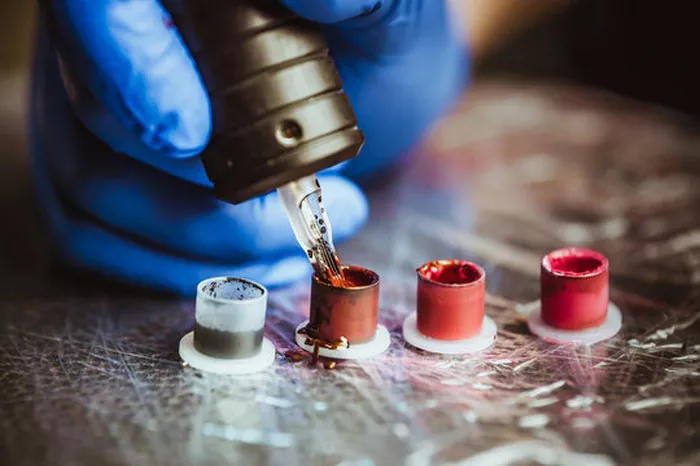Getting a tattoo is a significant decision that involves considerations about design, placement, and the artist. However, one critical aspect that is often overlooked is the potential for allergic reactions to tattoo ink. Tattoo ink allergies can range from mild discomfort to severe reactions requiring medical attention. This article will delve into the symptoms, causes, identification, diagnosis, treatment options and prevention tips.
Symptoms of Tattoo Ink Allergies
Tattoo ink allergies can manifest in various ways, ranging from mild to severe. Recognizing these symptoms is crucial for timely intervention and treatment.
Mild Reactions
Itching: One of the most common symptoms of a mild allergic reaction is persistent itching at the tattoo site. This itching can be bothersome but is usually manageable with over-the-counter treatments.
Redness: Mild redness around the tattoo is typical during the initial healing phase. However, if the redness persists or worsens, it might indicate an allergic reaction.
Swelling: Some swelling is expected after getting a tattoo, but excessive or prolonged swelling may signal an allergy.
Rashes and Bumps: Allergic reactions can cause rashes or bumps to appear on or around the tattooed area.
Skin Flaking and Scaly Skin: The skin around the tattoo might become flaky or scaly, indicating an adverse reaction to the ink.
Severe Reactions
Intense Itching or Burning: Severe allergic reactions can cause intense itching or burning sensations that are difficult to ignore and may interfere with daily activities.
Pus or Drainage: The appearance of pus or drainage from the tattooed area suggests an infection, which may accompany a severe allergic reaction.
Blisters: Blisters forming on or around the tattoo can be a sign of a severe allergic reaction and require immediate medical attention.
Fever and Chills: These systemic symptoms indicate a serious issue that needs prompt medical intervention.
Difficulty Breathing: Although rare, difficulty breathing can occur in extreme cases and constitutes a medical emergency.
Causes of Allergic Reactions
Understanding what triggers allergic reactions to tattoo ink is essential for both prevention and treatment.
Ingredients in Tattoo Ink
Tattoo inks are composed of various ingredients, including pigments and carriers. Some of these ingredients can cause allergic reactions.
Metals: Many tattoo inks contain metals such as nickel, chromium, and cobalt, which are common allergens.
Colorants: Different colorants are used to achieve various ink shades. Some individuals may be allergic to specific colorants used in tattoo inks.
Preservatives: Preservatives are added to tattoo inks to prevent contamination and extend shelf life. However, these chemicals can also cause allergic reactions.
Impurities: Low-quality inks may contain impurities that can trigger allergic responses.
Common Allergens
Red Ink: Red ink is often cited as a common allergen. It contains mercury sulfide (cinnabar), which is known to cause allergic reactions in some people.
SEE ALSO: How to Clean a Tattoo After 24 Hours
Identification and Diagnosis
Differentiating between normal healing processes and allergic reactions is crucial for appropriate treatment.
How to Recognize an Allergy
Normal Healing vs. Allergic Reactions: It is normal for a new tattoo to exhibit some redness, swelling, and slight itching as it heals. However, if these symptoms persist beyond the typical healing period (usually 2-3 weeks) or if they worsen, it could indicate an allergy.
Unusual Symptoms: Symptoms such as excessive itching, burning, rashes, or blisters that do not improve with standard aftercare measures may signal an allergic reaction.
Consulting a Professional
Dermatologist Consultation: Seeing a dermatologist is essential for a proper diagnosis. They can differentiate between an allergic reaction and other potential issues such as infections or skin conditions.
Skin Patch Testing: A dermatologist may perform a skin patch test to determine which specific component of the tattoo ink is causing the allergic reaction.
Treatment Options
Treatment for tattoo ink allergies depends on the severity of the reaction.
Home Remedies
For mild allergic reactions, several home remedies can provide relief:
Over-the-Counter Antihistamines: Oral antihistamines can help reduce itching and swelling associated with allergic reactions.
Topical Steroids: Applying topical steroids, such as hydrocortisone cream, can alleviate itching and inflammation.
Cold Compresses: Applying a cold compress to the affected area can soothe itching and reduce swelling.
Medical Treatments
Severe allergic reactions may require medical intervention:
Prescription Medications: A dermatologist may prescribe stronger antihistamines or corticosteroids to manage severe allergic reactions.
Professional Removal: In cases where the allergic reaction is severe and persistent, professional tattoo removal might be necessary. This can be done using laser treatments or surgical methods.
Prevention Tips
Taking preventive measures can help minimize the risk of developing an allergic reaction to tattoo ink.
Patch Testing
Testing a Small Amount: Before getting a full tattoo, consider patch testing a small amount of the ink on your skin. This can help identify potential allergies before committing to a larger tattoo.
Wait and Observe: After the patch test, wait 24-48 hours to observe any adverse reactions. If no reaction occurs, the ink is likely safe for you.
Choosing Safe Inks
Inquiring About Ingredients: Ask your tattoo artist about the ingredients in the ink they use. Opt for inks that are known to cause fewer allergic reactions.
Reputable Tattoo Shops: Choose reputable tattoo shops that use high-quality, safe inks and adhere to strict hygiene standards.
Conclusion
Tattoo ink allergies can range from mild to severe and can significantly impact the tattoo healing process. Recognizing the symptoms, understanding the causes, and knowing how to identify and treat allergic reactions are essential for anyone considering getting a tattoo. Preventive measures such as patch testing and choosing safe inks can help minimize the risk of allergic reactions. If you suspect you have a tattoo ink allergy, consulting a dermatologist for a proper diagnosis and treatment plan is crucial. By taking these steps, you can enjoy your tattoo with peace of mind and ensure it heals beautifully.
Related Topics

